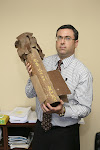Sol Teichman survived the Holocaust and came to America as a penniless immigrant not knowing a word of English. In 1951, during the Korean War, Sol was drafted into the United States Army. He served in Germany and then France.
One of my closest friends here in Los Angeles is Mr. Sol Teichman, a prominent citizen, businessman, philanthropist, and a Holocaust survivor.
Born on September 9, 1927, in the Hungarian town of Munkacs, Sol’s family were prominent and prosperous grain, bean and walnut merchants. The family lived in a lovely home in a quiet cul-de-sac and were known in the tight-knit Jewish community for their piety, charity, and close ties to the Belzer and Munkacs Hasidic dynasties.
Of course, the Nazi death grip descended on the Jews of Hungary, and by 1943, the Teichman home and business had been confiscated. The Jews of Munkacs were cruelly herded into a ghetto and then shipped in cattle cars to Auschwitz.
Sol, 17 years old, and his brother Steve, 14, survived the death camp, only to be sent on a death march to Dachau in August 1944.
Here is an excerpt from Sol’s privately printed memoir, The Long Journey Home, which I coauthored with Mr. Teichman, in which he describes hell on earth.
The Crimson Lake
It was a death march, and I was terrified at each and every step. My body was convulsed with excruciating muscle spasms. Everywhere was the sharp crack of rifle fire as the Germans picked off one Jew after another. Was I going to be murdered next? I had no idea where we were going or for how long we were going to march. Would we be on this road for one day, two days, a week, a month, or did the Germans plan on marching us until we were all dead? Not knowing was torture, just as the Germans planned.
If a prisoner tried to step aside to relieve himself, he was shot, bayoneted or beaten to death with the heavy butt of a rifle.
On the first night of the march my brother Steve lost heart.
“I don’t want to go on. I don’t want to live,” he said.
I looked at my brother and I knew in the depths of my soul that there was no choice. And so, though Steve was bigger and heavier than me, I leaned over, draped him over my back and carried my brother.
All I could do was place one foot in front of the other, one breath and then another.
We marched for days and nights without food or water. The heat was unbearable. My bones felt crushed, pulverized. Every breath was torture, my lungs felt as if they were exploding from unbearable pressure. But I knew that if I stopped, if I collapsed, the Germans would shoot us, beat us to death, or let their attack dogs rip us from limb to limb. And so I staggered onward.
One day, in the distance, we spied a lake. I think it was T’sha B’Av night. Many of the men on the march started running towards the water, desperate to get a drink of water. As I staggered closer to the lake I saw that the water was a strange color.
And then I realized that the lake was red.
The Germans were shooting hundreds of Jews by the shores of the lake—and the water turned to blood.
We stood and stared at the crimson lake. I could not, would not, drink the bloody water.
We lay down, tried to sleep, and then in the middle of the night a tremendous thunderstorm exploded. Rain poured from the sky.
I stood in the middle of the field, opened my mouth and savored the sharp needles of rain dripping down my throat. The thunderstorm was miraculous and provided just enough water to relieve my overwhelming thirst.
Shivering in the rain and mud, I snatched bits of fitful sleep.
In the middle of the night I awoke and watched in dismay as starved prisoners, crazed by empty bellies, shoved tufts of grass—black dirt clinging to the roots—into their mouths, chewed and swallowed.
In the inky darkness, someone whispered that nearby was a meadow filled with wild potatoes. Steve wanted to sneak into the field and eat the raw potatoes, but I wouldn’t let him. I knew that they would make us sick. Taking advantage of the night because the German guards couldn’t see what was going on, some Jews did sneak off and pick the potatoes. They devoured the raw potatoes in quick, starving bites. But soon they doubled over with agonizing cramps and diarrhea, and then, a few hours later, they died. Those who didn’t die, those who were too sick to move, were shot to death by the Germans.
Later, I discovered that, carrying Steve on my back, I had marched for four days and covered approximately seventy miles. But at the time, not knowing how long or how far I traveled, time seemed to vanish and distances seemed endless as I pushed onward, day after day under the oppressive heat, my back bent like a bow. My throat was parched from thirst; the sun beat down and my skin was burned raw. I was dizzy from exhaustion, hunger and fear. Every bone in my body was throbbing. I felt like a marching skeleton. Thousands were murdered along that road. My fellow Jewish prisoners were beaten to death with wooden clubs and iron bars. Some Jews welcomed death for life had become endless torture, unendurable.
Four uncles and several cousins died on this death march.
In a daze, I realized that we had reached a valley. There we camped for the night. The next day we continued a short distance to a railhead and were loaded on cattle cars bound for Dachau.
When we started the march we were about 6,000 Jews, arriving at Dachau there were only about 600 survivors.

